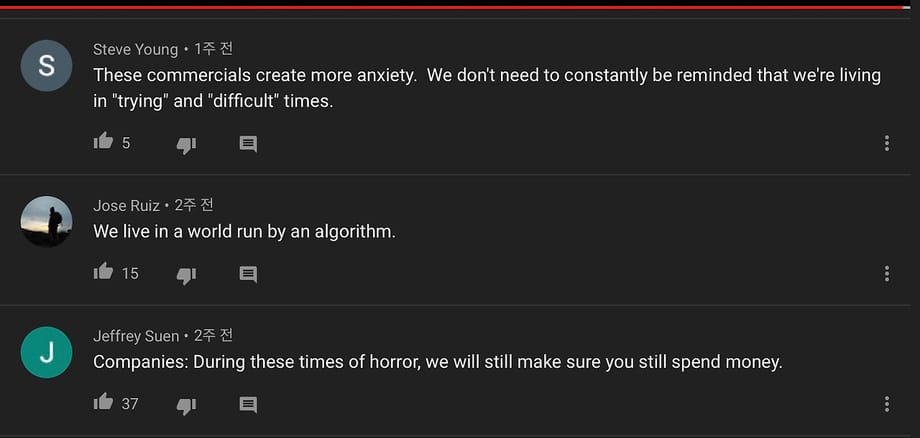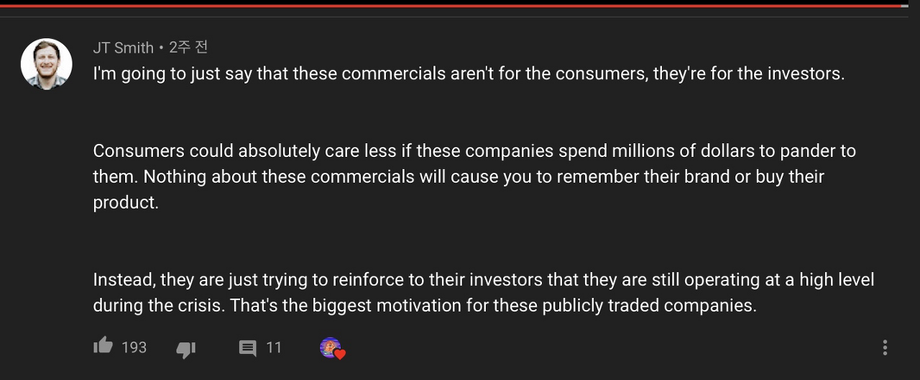This is an AI translated post.
Tough times, but you still need to consume.
- Writing language: Korean
- •
-
Base country: All countries
- •
- Economy
Select Language
Summarized by durumis AI
- After COVID-19, corporate advertising expresses empathy in an anxious era, but consumers are questioning the authenticity of companies, and companies need to think about ways to directly address customer anxieties instead of revealing their inherent intentions for profit generation.
- Corporate social responsibility (CSR) activities alone cannot create genuine connections with customers, and companies need to focus on developing services and products that understand and address customer anxieties.
- In particular, consumers in the cosmetics industry are feeling anxious about ingredient information, suggesting that it is important for companies to provide services that can address these customer concerns.
About the questions that companies need after COVID-19
First, check out the video below.
Every COVID-19 commercial is exactly the same
It is said to be a video that collects dozens of advertisements made by companies in the midst of this COVID-19 crisis.
And the following are the repeating elements that are found in them.
- Similar piano music
- uncertain times
- people
- families
- home
- we are here for you
- together
At first glance, you can conclude that everyone has similar ideas for making advertisements.
However, as you look at the comments, you can also catch a glimpse of various perspectives on corporate advertising over the years.
The most prominent one is anger and discomfort.



Among them, there are also comments that reveal the disappointment of someone in the marketing field toward the related industry,

In fact, there is an opinion that these advertisements are not for consumers but are made for the company's investors.

In addition, there is a comment that I watched the video to refer to the copywriting that needs to be delivered by tomorrow for the advertisement to go into the local hospital.
Why is this happening?
Imagine a situation where you are working for a brand company and your former colleague introduces you to a junior who runs a small advertising company.
Throughout the dinner, the man in front of you is friendly, kind, and has a clean and neat impression, and wants to get closer to you, but you are not comfortable. Because the background and situation of this evening gathering, and the purpose of each person are all revealed.
People react to intention.
And empathy with revealed intention reveals its limits in the relationship with the other person faster than you think. The Naver Children's Encyclopedia defines intention (intention, 意圖) as 'a determination to perform a specific action in order to achieve a certain goal when the right opportunity arises'. The company's inherent intention to make a profit, hidden even by the sincere music and warm smiles in the advertisement above. Aren't people responding to this intention first?
Of course, the reason for the existence of a company is to make profits, so it is natural for its inherent intention to be maintained. However, I wanted to say that there is a difference in where to create a touchpoint with customers, even if the intentions are the same.
Looking at the other person's situation vs. looking from the other person's situation
A few years ago, when I attended a conference as a speaker at an advertising festival, I gave the following example related to the above. Dalai Lama, the spiritual leader of Tibet, about the difference between 'empathy' and 'compassion' that he talks about.
"When we see someone who is crushed by a big rock while walking, thinking 'It must hurt so much' is called 'empathy'. And not only that, but also going further, getting a lever and removing the rock from the person's chest, or going around to other people and saying, "There's someone lying on the ground here! Help!" and asking for help, that's compassion."
In short, it is the difference in whether or not there is 'action' after understanding the situation.
And the subsequent question, "Isn't that part of CSR (Corporate Social Responsibility)? It should be discussed in terms of promotion, not advertising or service."
Actually, I agree with the corporate stance of looking at people's pain as only social responsibility.
And for the same reason, I understand the reaction of those who saw the advertisement mentioned earlier. As companies see people's suffering as observers, it is quite natural for customers to see companies as objects that only want their consumption, as a result of very natural mutual interaction.
In 2015, SK II, a P&G company, partnered with Google to run Beauty Bound asia, a tournament event to find the second Michelle Phan (first-generation beauty YouTuber) in 11 Asian cities. At the time, I was working at an advertising company and was a creative director in charge of global content. I was on site for a few months as the event was taking place.
At the time, through interviews with famous beauty creators who participated as judges, and continuous confirmation of comments from people related to the content of the channels they run, I understood the following reasons why these influencers grow and are recognized.
'I experience the worries I have beforehand, and I take the initiative to check them out and provide information about them.'
They started from their own concerns as consumers, and gradually brought in people who have the same concerns. People who watch video content felt gratitude, and the brands and products launched by these beauty creators naturally created situations where viewers directly became consumers. (Example: Krave Beauty by Rhea Yoo)https://kravebeauty.co.kr/company/location.html
People's anxiety, to embrace it or to look at it?
Anthony Fauci, director of the National Institute of Allergy and Infectious Diseases (NIAID), said, "We don't decide the time, the virus does." The situation is still ongoing, and even after it stabilizes, it's hard to predict when we'll face unfamiliar and hopeless situations like this again caused by a new virus.
Some people have lost their families or jobs, while others say that nothing has changed much other than a few months of halted income and consumption. Companies have also gone bankrupt, but there are certainly those that have grown more than before. Unlike the 2008 financial crisis, which was a clear external factor, the changes that began with the lockdown, from the real sector, including a decline in consumption and the resulting changes, are ambiguous in that everyone has been affected to a certain extent. This means that it is likely that the long-term market forecasts and strategic planning from the perspective of companies will become increasingly unreliable.
People close to me have worried about their own situation of being unable to do anything during this period, and some say they have experienced the limits of their ability to make a living as individuals. This is directly linked to questions about oneself, one's role towards one's family, and the meaning of the existence of one's family and friends around oneself. It seems that such questions about oneself after experiencing the limits of one's existing self leave scars that we don't know how or when they will bring about changes in our perception of ourselves and our actions.
In other words,It is difficult to clearly define the current anxiety.
But we can think about the questions to understand this anxiety and find a starting point from there.
'Hwahae', which provides information on cosmetics, recently recorded a transaction volume of 10 billion won within the platform. Although I know there are controversies over the chemical ingredient analysis criteria, it seems clear why this company is being attacked by the existing industry and consumers are choosing them.
'Asymmetry of information' about chemical ingredient products used in everyday life. This leads to vague anxiety. As a woman, the desire to be beautiful and the anxiety about health for me and my children as a prospective mother seem to have given meaning to the service and existence of 'Hwahae'.
What is the essence of our business? What is the anxiety that our customers are experiencing in this situation, and how can we solve it with our services and products?
These questions cannot be said to be accurate. However, it seems clear that the marketing department is not the place where meaningless empathy stories that are repeated without feeling like empathy are created, just like the company's message in the advertisement shared earlier. It is a question that can be asked and started at the R&D stage where services and products are planned and customer realities are investigated.





